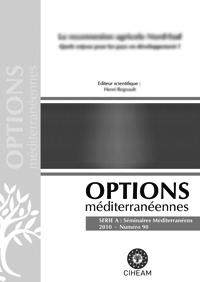| Article précédent | p. 181-184 | Article suivant |
Agronomic response of winter melon (Cucumis melo inodorus Naud.) to biodegradable and polyethylene film mulches, and to different planting densities
The winter melon is widely grown in the open field in Sicily on about 6000 hectares. Plants are grown in the countryside without irrigation as the annual rain precipitation provides sufficient water for the crop. In the last decades the use of plastic mulches has enhanced early winter melon and total yields. However, disadvantages of plastic mulches are the need to remove and dispose of them after use. The objective of this research was to evaluate effects of polyethylene (PE) and biodegradable films in combination with two planting densities, 2667 or 5334 plants per ha on yield, fruit size, quality and earliness of winter melon. All mulches markedly increased early and total yields in comparison to unmulched plots. The best results were obtained with the highest plant density and by mulching with either transparent PE film or transparent biodegradable film. This study demonstrated that the transparent biodegradable film is an efficient environmentally friendly alternative to plastic mulching.
- [ Afficher ]
- [ Télécharger ]
- [ Exporter la citation ]
Vous pouvez télécharger la citation au format :
- [ Imprimer ]
-
Mots-clés
BIODEGRATION, MELON, PAILLAGE, POPULATION VEGETALECiter cet article
Incalcaterra G., Sciortino A., Vetrano F., Iapichino G. Agronomic response of winter melon (Cucumis melo inodorus Naud.) to biodegradable and polyethylene film mulches, and to different planting densities. In : Cantero-Martínez C. (ed.), Gabiña D. (ed.). Mediterranean rainfed agriculture: Strategies for sustainability . Zaragoza : CIHEAM, 2004. p. 181-184. (Options Méditerranéennes : Série A. Séminaires Méditerranéens; n. 60). Final Seminar of the Regional Action Programme on Rainfed Agriculture (RAP-RAG), 2003/06/02-03, Zaragoza (Spain). http://om.ciheam.org/om/pdf/a60/04600061.pdf



